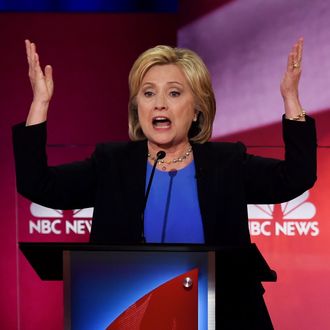
For the first nine months of the Democratic presidential campaign, Bernie Sanders has distinguished himself from Hillary Clinton by pointing to their disparate sources of campaign funding. While the former secretary of State has accepted millions of dollars from Wall Street firms and other special interests, the Vermont senator has built his war chest from over three million individual contributers, who have donated an average of $27. Sanders has repeatedly suggested that the influence of big-dollar donors is the primary reason his ambitious social-democratic agenda is considered radical in Washington. But Sanders has never quite made the implicit leap — that the primary reason Clinton doesn’t support his agenda is because she is campaigning under the influence of the “billionaire class.”
At Thursday night’s debate in New Hampshire, Hillary Clinton asked Bernie Sanders to speak his subtext.
“There is this attack that he is putting forth, which really comes down to: Anybody who ever took donations or speaking fees has to be bought. And I just reject that senator,” Clinton said. “I really don’t think these kind of attacks by insinuation are worthy of you. Enough is enough, if you’ve got something to say: Say it.”
And then, Sanders did. And it was one of the most riveting ten minutes of debate in the history of American presidential politics.
“You will not find that I ever changed a view or a vote because of any donation that I ever received,” Clinton said. “So I think it’s time to end the very artful smear that you and your campaign have been carrying out in recent weeks, and lets talk about the issues.”
Sanders and the crowd did a Jerry Springer-esque “ooh” sound at the word smear. Then the Vermont senator agreed to talk about the issues, asking whether the deregulation of Wall Street in the nineties had anything to do with the money the financial industry spent on campaigns and lobbying. Or if the fact that “the price of your medicine can be doubled tomorrow and there’s nothing the government can do to stop it,” had anything to do with the campaign spending of pharmaceutical companies? Or if the impossibility of passing comprehensive climate-change legislation had anything to do with the giving of fossil-fuel producers?
“There is a reason why these people are putting huge amounts of money into our political system and in my view it is undermining American democracy,” Sanders said.
While still refusing to explicitly accuse Clinton of being corrupted, Sanders appeared to be arguing, at the very least, that her participation in the corrupt campaign-finance system helped to perpetuate its existence.
Clinton responded by agreeing that she has spent much of her career on the receiving end of plutocrats’ political spending — but in an entirely different sense.
“When I took on the drug companies and insurance companies, they went after me with a vengeance,” Clinton said, speaking of her efforts to pass universal health care in the early nineties. Then, she pointed out the bizarre irony that Sanders had actually benefited from anti-Clinton conservative money in this very race, claiming that Karl Rove and company had bankrolled negative ads against the former secretary of State, on the apparent theory that Sanders will be easier prey for Republicans come November.
Finally, Clinton noted that Sanders was the one who did Wall Street a solid in 2000, when he voted to deregulate swaps and derivatives — as a certain former Democratic president had proposed.






























